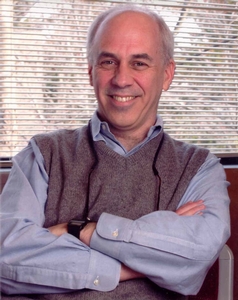Professor Profile: Dan Chambliss, Sociology
by Dan Chambliss
EUGENE M. TOBIN DISTINGUISHED PROFESSOR OF SOCIOLOGY
This is part of a series on what research our professors pursue outside of the classroom. It is intended to further Hamilton’s understanding of the scientific and academic community we have on campus.
How did you get to where you are today?
I’ve wanted to be a teacher since I was about 13, when I realized I could do a better job—even at the time—than my high school history teacher (No brag, just fact). When I went to college (New College in Florida), I discovered sociology and found that it included everything I liked about psychology, philosophy and history, plus other goodies. You could study basically anything. I got a PhD at Yale and applied for lots of jobs. Hamilton was the only place that seemed to want me, and I knew I wanted to be at a small liberal arts place. I’ve been here for 30 years.
Why did you choose Hamilton?
I didn’t, specifically. They chose me and told me I could teach whatever I wanted in any way I wanted. That was crucial.
What is your specialty in your field? What research question(s) are you currently interested in?
I study the social psychology of organizations, which basically means I try to figure out how people act in organizations—sports teams, hospitals and colleges are three cases I’ve looked at (roughly ten years each) and written books about. Typically, I just spend lots of time watching and talking with people in organizations, then try to write about what I see. I also have done a fair bit of business consulting, so I know about those kinds of settings as well.
Currently, I’m working with a former student on a book called How College Works, which tells how the good stuff in college comes about. Short answer: It’s who you spend time with. People, not programs, are what matter. Spend time with the best possible people.
Why are you interested in these? What is their relevance to the field and to the world? Why you personally find them important?
I don’t have much of an answer here. People spend their work lives in organizational settings, many of which are truly messed up, frustrating, ineffective and even damaging. I’d like them to be better. Meanwhile, I just find the work somewhat interesting. But in truth, I’m mainly a teacher, not a scholar.
What is unique about your teaching style or methods? Why should students take classes with you?
I doubt that anything I do is unique. You ask, “Why take my classes?” Ask a student, not me. I will say, though, whatever my strengths and weaknesses, I try to respect my students as thinkers and human beings. I take them seriously. Everything else—I hope—flows from that. Mainly I just like talking with young people about ideas and about their lives and interests.
What are your passions outside of academics?
Passion is a big word; let’s just say I really enjoy reading, a lot. Do it all the time. I’m also lucky enough to be happily married with four great stepchildren and two (naturally) adorable grandchildren. I love a really good conversation. I’ve also been known, in younger days, to dance from 10 p.m. until 6 a.m.; that was a passion. I used to coach competitive swimming; that was a passion.
What is your favorite Hamilton College tradition?
At graduation, the faculty form a double rank through which the graduates process out. It’s a high point of my year.
If you could go back in time to when you were in college and give yourself one piece of advice, what would it be?
Perhaps: Be more open to love. I tended to be a bit picky, for silly reasons. But that’s not what you meant, I suspect. So let’s say, I’d just do exactly what I did: Found a wonderful mentor very early and worked with her for four years; had a dozen or so of the nicest, smartest friends you’d ever want, lived in a gorgeous locale and spent four years having serious fun—reading and talking about great books and ideas, trying out lots of things, caring about the community I was in, dancing all night (see above) and living joyfully. I wouldn’t trade it for anything.
Which class is your favorite to teach right now?
Self in Society. For 34 years now (I first tried it at my own undergraduate college), students have told me it changed their lives—in a good way. Teaching is a deployment of personality—an expression of who one is—and that course is me.
What class would you most want to teach if you got the chance?
“If I had the chance?” When I was offered the job at Hamilton, the department chair asked me “what do you want?” I said I wanted to teach whatever I wanted, any way that I wanted. He gave me that. I’ve had the chance, plenty of times. I pretty much teach what I like to teach. I’ve been incredibly lucky: students who want to learn, colleagues who care about what we’re doing. Wow.

